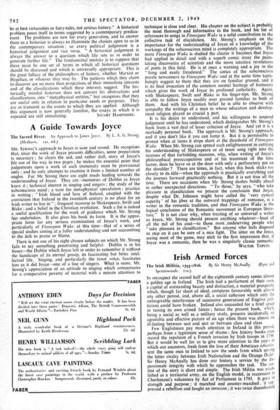A Guide Towards Joyce
The Sacred River. An Approach to James Joyce. By L. A. G. Strong. (Methuen. los. 6d.)
MR. S'IRONG'S approach to Joyce is sane and sound. He recognises that, since the work of Joyce presents difficulties, some preparation is necessary ; he clears the sad, and rather dull, story of Joyce's life out of the way in two pages ; he makes the essential point that judgements upon a work of such immensity must be provisional only ; and he only attempts to examine it from a limited number of angles. For Mr Strong there are eight roads leading towards the understanding of Joyce. They are—memories of Dublin as Joyce knew it ; technical interest in singing and singers ; the study of the subconscious mind ; a taste for metaphysical speculation ; practice in writing ; " Irish blood and love of Ireland, coupled with the conviction that Ireland in the twentieth century is no place for an Irish writer to live in " ; frequent recourse to Shakespeare, Swift and Blake ; and a belief in the Christian revelation. Such a list is indeed a useful qualification for the work of guidance which Mr. Strong has undertaken. It also gives his book its form. It is the appro- priate form for any serious examination of Joyce's work, and particularly of Finnegans Wake, at this time—that of a series of special studies aiming at a fuller understanding and not succumbing to the itch to praise or blame.
There is not one of his eight chosen subjects on which Mr. Strong fails to say something penetrating and helpful. Dublin is in his bones—the Dublin which Joyce left in order to remember it without the handicaps of its eternal gossip, its fascinating but bitter intel- lectual life. Singing, and particularly the tenor voice, fascinates him as it did Joyce—one of a line of singers. What is more. Mr. Strong's appreciation of an attitude to singing which compensates for a comparative poverty of material with a minute attention to
technique is close and clear. His chapter on the subject is probably the most thorough and informative in the book, and his list of references to songs in Finnegans Wake is a solid contribution to the collective task of elucidation. Mr. Strong's emphasis on the importance for the understanding of Joyce of a knowledge of the workings of the subconscious mind is completely appropriate. The more Finnegans Wake is studied the clearer it becomes that Joyce had applied in detail and with a superb comic irony the pains- taking discoveries of scientists and the more intuitive revelations of poets in this field. He is at once a warning and a joy to the " Jung and easily freudened." The antics of the subconscious puzzle newcomers to Finnegans Wake and at the same time taina- lisingly suggest to them that they are on familiar ground, and it is its final evocation of the common mental heritage of humanity which gives the work of Joyce its profound catholicity. Again, with Shakespeare, Swift and Blake at his finger-tips, Mr. Strong is able to follow Joyce readily over ground familiar to both of them. And with his Christian belief he is able to observe with sympathy the writings of a man in whose education and develop. ment religion played so crucial a part.
It is his desire to understand, and his willingness to suspend judgement until he has understood, which distinguishes Mr. Strong's book from a vast deal of lesser criticism of Joyce. And yet it is a markedly personal book. The approach is Mr. Strong's approach, and if you don't like it you can lump it. But it is permissible to protest when at times it stops short at the threshold of Finnegans Wake. When Mr. Strong can spread such enlightenment in carrying his understanding of Shakespeare or of tenor song right into the recesses of that forbidding mansion, why, when writing of Joyce's philosophical preoccupations and of his treatment of the time factor, does he leave us at the door with only a perfunctory pat on the shoulder ? There are times, in fact, when this book sticks too closely to its title—when the approach is practically everything and the journey forward practically nothing. But it is not true all the time. There are occasions when Mr Strong dashes boldly ahead in rather unexpected directions. " To those,", he says, " who take pleasure in classification we present the conclusion that Joyce, despite what Dr. Johnson might have called the ` very cynical asperity ' of his jibes at the outward trappings of romance, is a writer in the romantic tradition, and that Finnegans Wake is the logical conclusion of the Romantic movement in European litera- ture." It is not clear why, when treating of so universal a writer as Joyce, Mr. Strong should present anything whatever—least of all the tail of his coat—to those most _undeserving people who " take pleasure in classification." But anyone who feels disposed to step on it can be sure of a nice fight. The sitter on the fence, seeing most of the game, may stick to the first impression that, if Joyce was a romantic, then he was a singularly classic romantic.
WALTER TAPLIN.


































 Previous page
Previous page